The City of Waco is receiving $34.7 million in federal COVID relief funds, and city leaders want community input on how to spend a portion of the funds.
Waco received $17.4 million in June from the American Rescue Plan and will receive a second payment next year for a total of $34.7 million.
“The City of Waco intends to use $15 million … for municipal purposes including improvements to infrastructure for Water, Wastewater, and WMARSS as well as for other infrastructure resiliency and backup projects,” says the City’s website.
The city plan also has set aside $17 million to provide direct assistance to households and businesses. The exact use of these funds will be determined based on community feedback using the Balancing Act Tool.
Council Member Kelly Palmer said: “The data collected from the tool will shape how we invest these funds in our communities. … The city will be gathering this data through the end of September.”
English Balancing Act Tool
Spanish Balancing Act Tool
The Balancing Act Tool allows you to allocate the $17 million to various categories of funding utilizing the available funds set aside for these purposes. “If you do not see any area in simulator, please add in your suggestions.”
The American Rescue Plan Act is the $1.9 trillion act signed into law March 11 by President Biden. The Act contained direct relief to citizens, including the $1,400 stimulus checks received earlier this year, and $350 billion for eligible state, local, territorial, and tribal governments to mitigate the fiscal effects stemming from the public health emergency created by the spread of COVID-19. This latter portion is providing the funds now available to Waco.
Guerra-Sanchez is one of 30 finalists in the Broadcom MASTERS, a premier middle school competition for science, technology, engineering, and mathematics.
By Joshua Wucher
Gabriela Guerra-Sanchez, a student in the ATLAS Academy at Tennyson Middle School, is among 30 finalists who will be competing for over $100,000 in awards and prizes in the Broadcom MASTERS middle school competition. Guerra-Sanchez was named a Top 30 finalist after advancing from the Top 300 MASTERS competition earlier this month. Participants in the Top 300 competition were selected from tens of thousands of regional and state science and engineering fair participants nationwide.
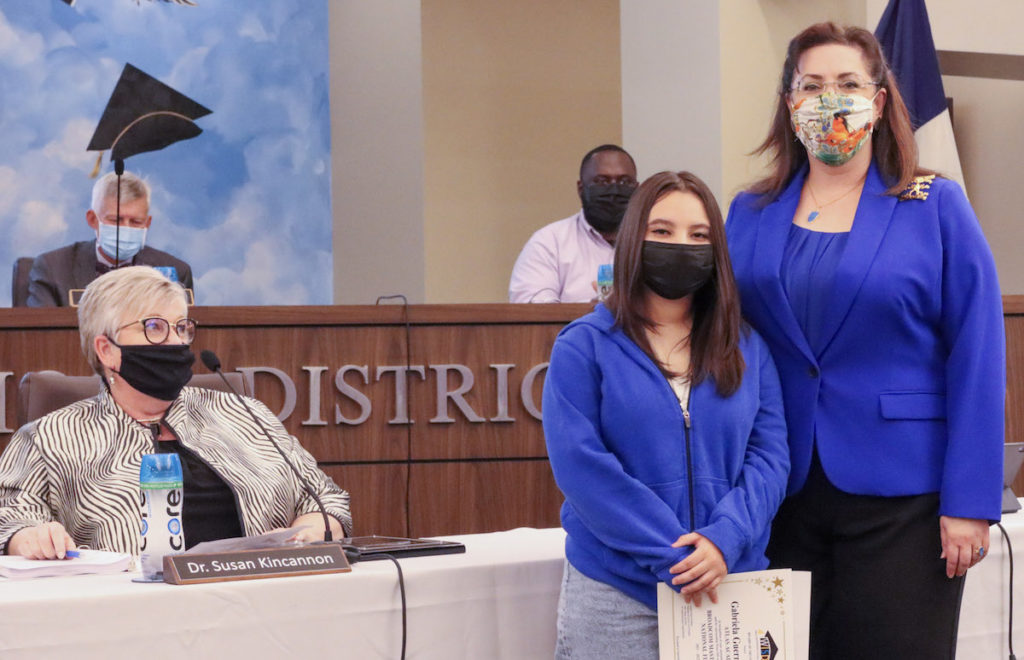
The MASTERS program, founded by the Society for Science, seeks to inspire young scientists, engineers, and innovators who will solve the grand challenges of the future. Each of the 30 finalists will participate in team challenges in addition to being judged on their science research project during a virtual competition in October.
“Gabriela is a creative, out-of-the-box thinker who worked incredibly hard to execute an amazing project. As an educator, I want my students to engage and enjoy learning and to help them realize the dream to pursue careers in STEM is attainable,” said Leslie Cannon, Tennyson Middle School teacher-librarian, who herself was among 66 stellar educators from across the country recently selected for the society’s Advocate program, which provides teachers training, stipends, and year-round support to mentor underrepresented students in entering science research competitions like Broadcom MASTERS.
Guerra-Sanchez’s winning project, titled “Can You Hear That? What Do You See?”, explores how different styles of background music can affect the way people see art. She collected data from survey responses from students who listened to music and then viewed an original abstract painting that she created.
“We are so proud of Gabriela for this outstanding accomplishment and excited to have her represent Waco ISD and Tennyson Middle School at the national level,” said Dr. Susan Kincannon, superintendent. “Her project represents the high level of critical thinking and learning happening in our schools. And teachers like Ms. Cannon are doing a tremendous job supporting students like Gabriela who aspire to become scientists, engineers and innovators.”
Additionally, Broadcom MASTERS is awarding each Top 30 finalist’s campus with $1,000 to use toward STEM activities and providing their science teacher with a one-year classroom subscription to Science News magazine.
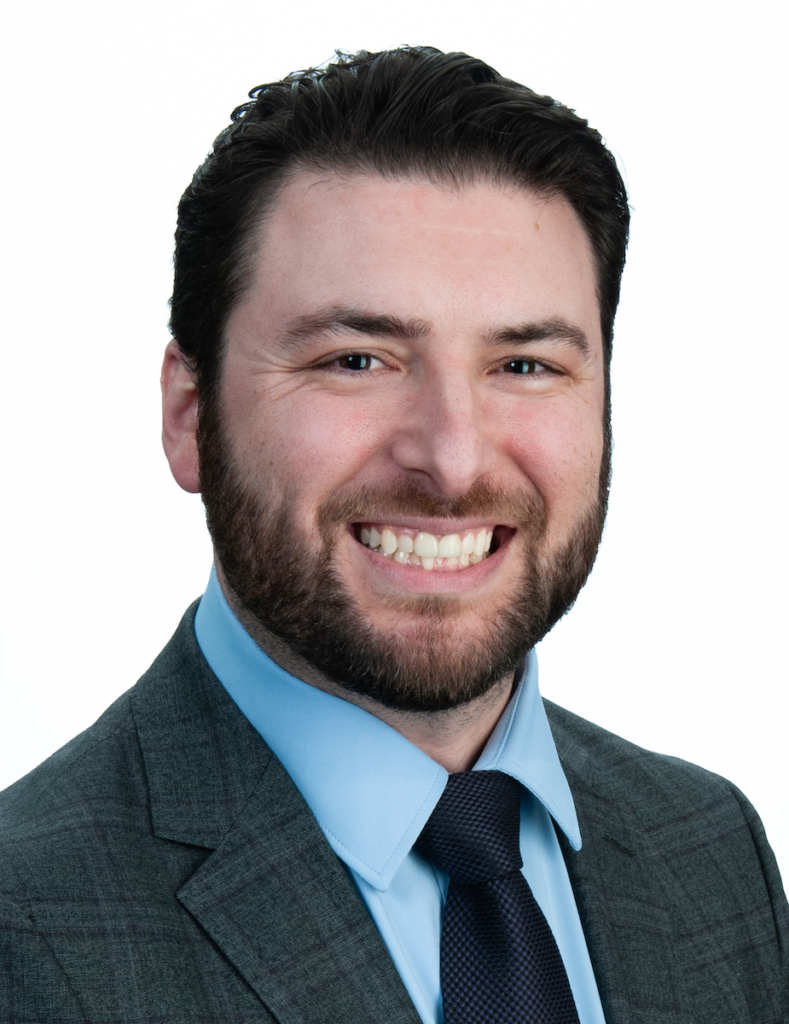
Joshua Wucher is Waco ISD’s executive director for communications.
The Act Locally Waco blog publishes posts with a connection to these aspirations for Waco. If you are interested in writing for the Act Locally Waco Blog, please email Ferrell Foster at [email protected].
By Susan Copeland
I have been working as program director of AmeriCorps Seniors RSVP for 29 years, and it has been my pleasure to serve seniors in the Heart of Texas for over 35 years. The RSVP program is sponsored by McLennan Community College and the national service agency, AmeriCorps.
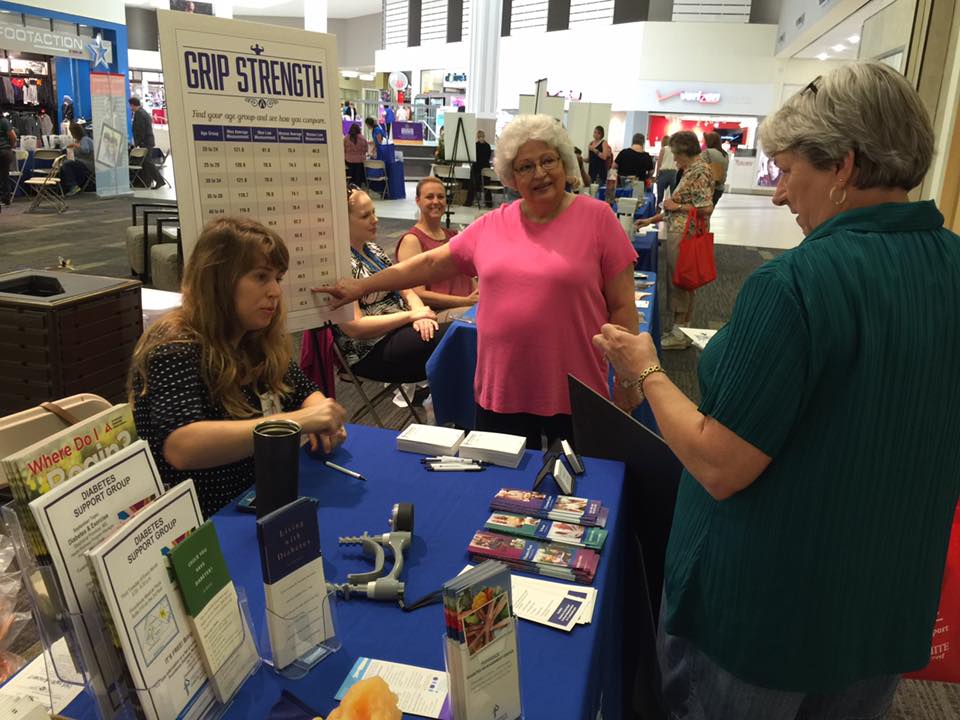
Our 29th Senior Source Health and Information Fair will be 10 a.m-2:30 p.m. Friday, Sept. 17 at Richland Mall. We are excited for the opportunity to bring one-stop information and screenings to our senior population.
In a time of many concerns with the pandemic, I believe this is a chance for folks to safely visit with programs, agencies, and professionals all in one open area. Plus, participants can get their flu shots and COVID vaccines with no appointments needed.
This event can provide services such as senior living options, legal advice, benefit counseling, and so much more all in one convenient location at the mall in an open area safely spaced for COVID precautions.
AmeriCorps Seniors-RSVP has been hosting this event from its beginning and I’ve seen thousands of people gain so much from the Heath Fair. It is so satisfying to see the participants get the information they need and also enjoy the day by meeting up with friends, shopping, and learning about all the services in our area.
Caregivers get to also ask questions and collect information, and the general public always gain something from walking through the fair. It’s a win-win day for everyone and we are happy to bring it to our community.
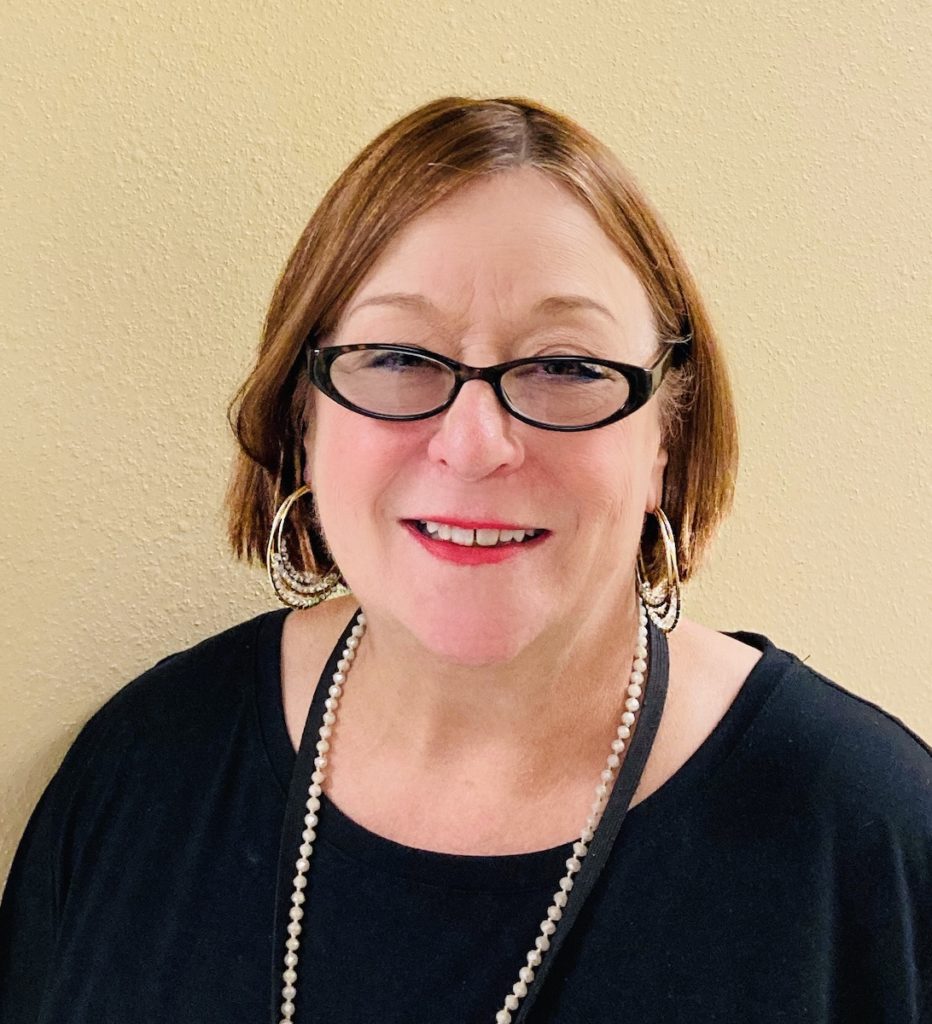
Susan Copeland is director of the Heart of Texas RSVP program. She oversees her staff plus about 10 undergraduate and graduate student interns studying public relations, professional writing, social work, mental health, and counseling. She manages more than 50 community service projects and a force of 650 senior adult volunteers in the six-county Heart of Texas Region.
The Act Locally Waco blog publishes posts with a connection to these aspirations for Waco. If you are interested in writing for the Act Locally Waco Blog, please email Ferrell Foster at [email protected].
By Lilly Price
Walking around the grounds at 1129 Webster Ave., you get the sense it is a space with deep history. The five-acre property, owned by Brazos River Capital, was once home to Khoury Inc., a family cabinet company that operated for nearly seven decades.
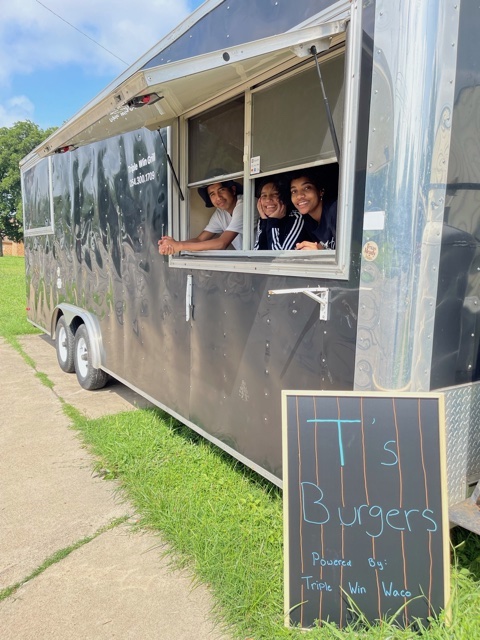
Now, it’s the location of a new joint venture operated by Triple Win Waco, an informal out-of-school-time work-based learning program that combines students and businesses for everything from manufacturing to running a food truck.
Originally, Triple Win used a workshop on Franklin Avenue and facilities at Connally Career Tech for its pilot programs, but it eventually found the space at Webster in 2020. Waco Pedal Tours, Triple Win, and Brazos River Capital agreed upon a three-year lease giving Triple Win the time to invest in research and development of their program with facilities large enough to host their vision. Founders Clay Springer and Cory Dickman chose the property because of its location near downtown and the geographic proximity to many of the students that Triple Win serves.
The group has grand plans for a STEM (science, technology, engineering, and math) campus. At present it houses a workshop and offices for local businesses, but eventually it will host a commissary kitchen, artist co-studio, maker’s market, food truck park, general store, student center, and co-working space.
Triple Win Waco and Rapoport Academy Public School are making a three-year commitment of almost $1 million dollars in seed funds, personnel funds, and equipment to execute Project Launch. The campus will direct and enrich work-based learning and thought leadership in STEM education and entrepreneurship to have a lasting impact on the Greater Waco community. The Webster campus will help serve as an incubator for student businesses, giving them access to resources and start-up funds with a path to profitability.
Triple Win starts at the individual level, connecting the interests of each student who enters the program. More broadly, the team behind Triple Win hopes the Webster campus will be a resource for all of Waco by leading the charge on STEM education in our city.
By advocating for each stakeholder involved in Triple Win — students, education, and businesses– the program works to cultivate the creativity and love of learning that every person has when they walk through the front doors.
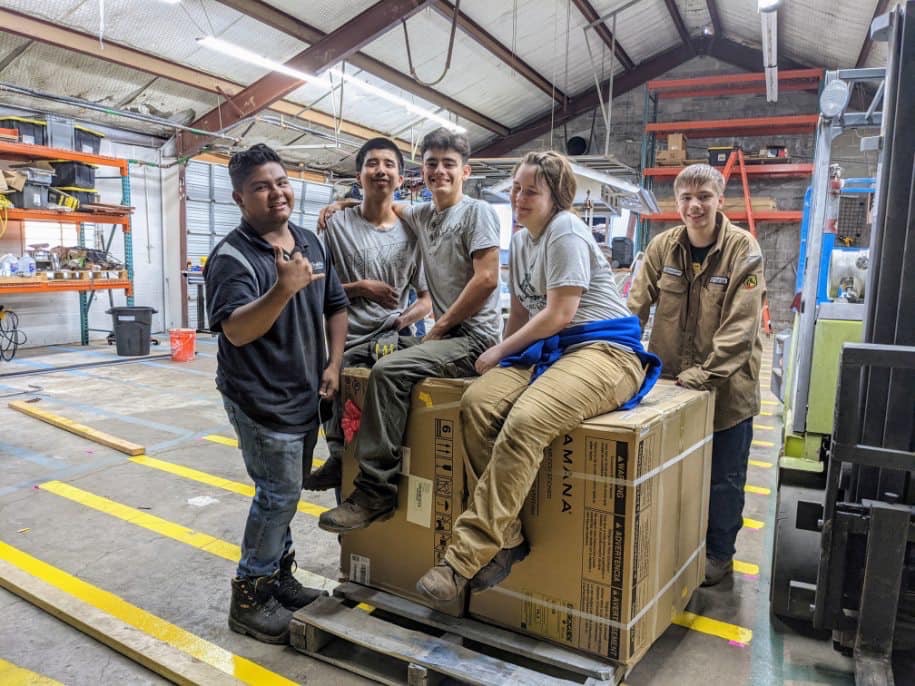
The fully renovated campus is set to unveil in February 2022 and will feature an expansion of Maker’s Edge Makerspace in partnership with Rogue Capital Investments. There’s something so appropriate about a building with a rich history of manufacturing and woodworking being transferred to students who are getting their start learning the ropes of fabrication and entrepreneurship.
In a way, it affirms the ongoing importance of work in STEM fields and the way industrial sectors will continue to benefit the local community. The Triple Win campus lies in the heart of South Waco, neighbored by spots like Jesse’s Tortilla Factory, Cotton Palace Park, and the Talitha Koum Institute.
Sustainable and equitable city growth means innovation that is led by people who live and work in the neighborhoods being developed, and Triple Win has made it a priority to partner with local businesses and organizations to see growth that reflects the culture of the city.
Beyond the practical significance of the Webster campus, the leaders of Triple Win hope the renovated property will become a community resource ideologically, as well as a place where people can work together and find a sense of belonging.
The Webster campus is represented by Hector Sabido, city councilman for District 2- which includes South Waco, Baylor, and downtown. “An educational resource like Triple Win would be transformative,” Sabido said. “Having a workspace that allows people to prepare for their future ideas and how they can implement those ideas and including the educational component and mentorship, that is something I want to see more of in my district … for people to be able to live out a dream they have.”

Central to Triple Win’s vision and values is the Waco community. By connecting families, students, businesses and educators, Triple Win seeks first to foster economic prosperity and continuing education for all. The renovation of the Webster campus is representative of that goal, which has motivated the work done at Triple Win since its inception in 2018.
For people like Rachel Pate, who was raised in the South Waco neighborhood and serves as vice president of economic development for Cen-Tex African American Chamber of Commerce, the work Triple Win is doing in the community is significant. “The Triple Win space brings new opportunities into an underserved community … better training means better opportunities and a better quality of life,” Pate said.
For students, the Webster campus represents a safe place, instructors who know their names and stories, friends who share their interests, and confidence gained from having the tools they need to build something new.
By working in a collaborative environment with facilities that are flexible to individual student interests, the Webster campus aims to foster innovation and a passion for exploration. To keep up to date with Triple Win’s renovation journey, visit https://triplewinapprenticeships.com.
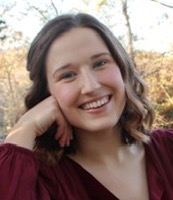
Lilly Price is a Baylor University alum and the Public Relations Coordinator for Triple Win Waco.
The Act Locally Waco blog publishes posts with a connection to these aspirations for Waco. If you are interested in writing for the Act Locally Waco Blog, please email Ferrell Foster at [email protected].
By Baylor School of Education
Baylor University has named Lakia Scott the school’s “Champion of Change” this year. Dr. Scott is an associate professor in Baylor’s School of Education.
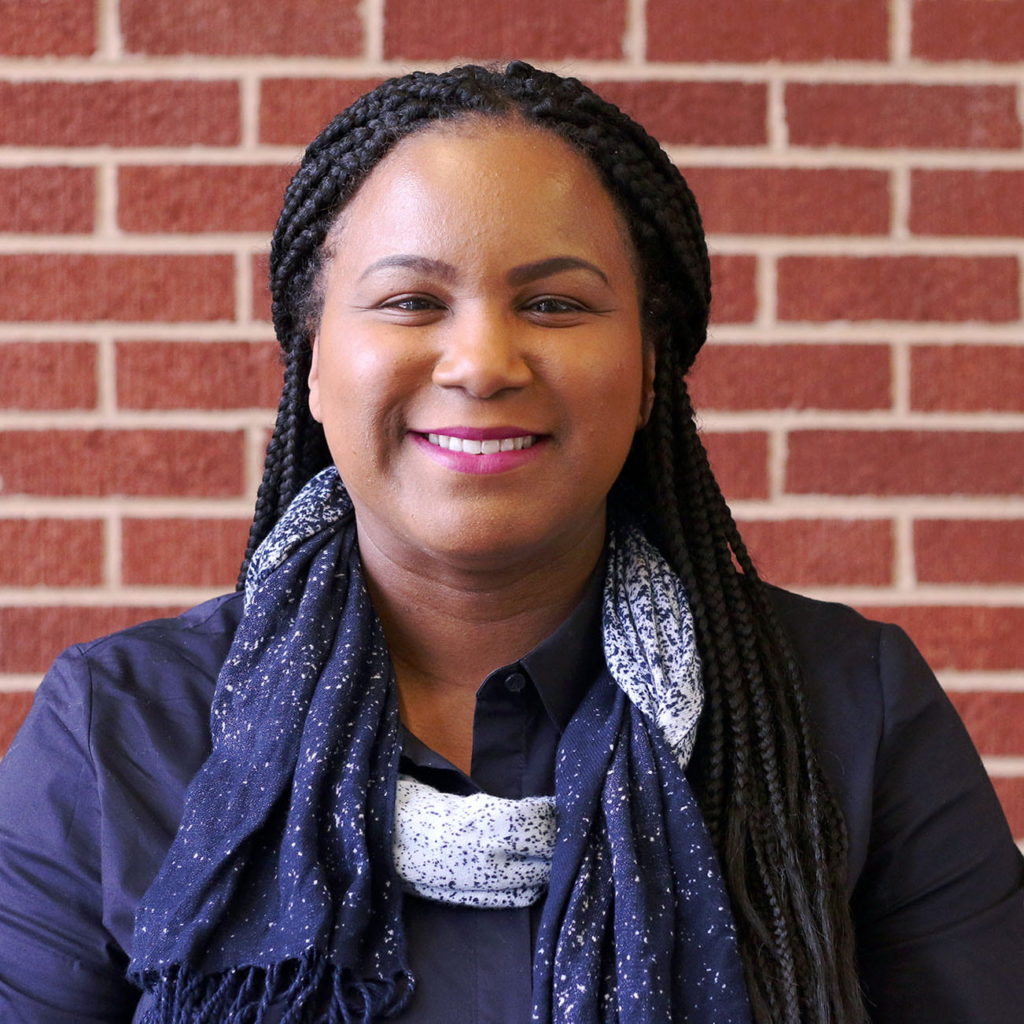
Baylor launched “Champions of Change” awards to recognize and acknowledge the accomplishments of faculty, staff, and alumni (one of each annually) who have demonstrated efforts to “foster greater appreciation and advancement of diversity, inclusiveness, and equity for communities of color at Baylor and in Waco.” A diverse and representative volunteer advisory committee sought nominations and made the final selections for the inaugural honorees.
Scott’s efforts in equity enhancement have included promoting the recruitment and retention of first-generation college students and students of color through advising student organizations; establishing a reputation for being empathetic and supportive of students from traditionally marginalized backgrounds; and focusing her research on multicultural awareness, diversity practices, and urban education and literacy.
“I am humbled by this recognition, and I do not take this honor lightly,” Scott said. “This notion of being a champion of change truly challenges us to continue in our efforts to call into question and/or critique the structural and systemic barriers that limit human flourishing. While I am grateful that my efforts have been noticed, there is still so much to do, especially in thinking about equitable education as a right, not a privilege, for all students in our country. I am thankful to do my part in Waco — the strides made here can provide a national model for evoking true change in education.”
For three years, Scott served as the Chair of the Campus Diversity Committee and currently serves on the President’s Diversity Council. Scott also won Baylor’s Diversity Enhancement Award in 2018 and this year is the recipient of Baylor’s Outstanding Faculty Teaching Award (tenure-track) She is the founding director of Baylor’s Freedom Schools, a summer literacy enrichment program for elementary and middle school youth which focuses on culturally relevant teaching practices and the utilization of multicultural literature in order to bridge summer learning loss.
Teaching in the Department of Curriculum & Instruction and serving as the department’s graduate program director, Scott is a recognized scholar in the field of Urban Education. Her credits include a host of research publications, co-authored and co-edited books, book chapters, and educational evaluation reports.
When the awards were presented at the end of the spring semester, Baylor President Dr. Linda Livingstone said, “The impact of this year’s Champions of Change echoes far beyond the halls of Baylor University, reverberating well into the greater Waco community. Each of these amazing leaders embodies the character and commitment to equity we seek in reflecting Baylor’s Christian mission.”
The impact of Scott’s work has indeed reverberated beyond campus, as she also received recognition from the Greater Waco Chamber of Commerce, receiving their “Waco Under 40” Award honoring “dynamic young leaders under the age of 40” who are making an impact in the greater Waco community.
Scott said, “I believe strongly that through service, love, and intentionality, we can transform our community spaces in ways that translate to human flourishing. I am honored to be among my esteemed peers and colleagues who also consider themselves servants of the greater Waco community.”
The Act Locally Waco blog publishes posts with a connection to these aspirations for Waco. If you are interested in writing for the Act Locally Waco Blog, please email Ferrell Foster at [email protected].
By Joshua Wucher
Waco ISD Superintendent Susan Kincannon announced today that she has selected Daniel Lopez as the district’s next assistant superintendent for human resources. In this role, Dr. Lopez will lead the strategic planning and implementation of human resource programs, including professional and auxiliary staffing, wage and salary administration, performance appraisal, and employee relations and retention initiatives, such as the teacher incentive allotment and opportunity culture.
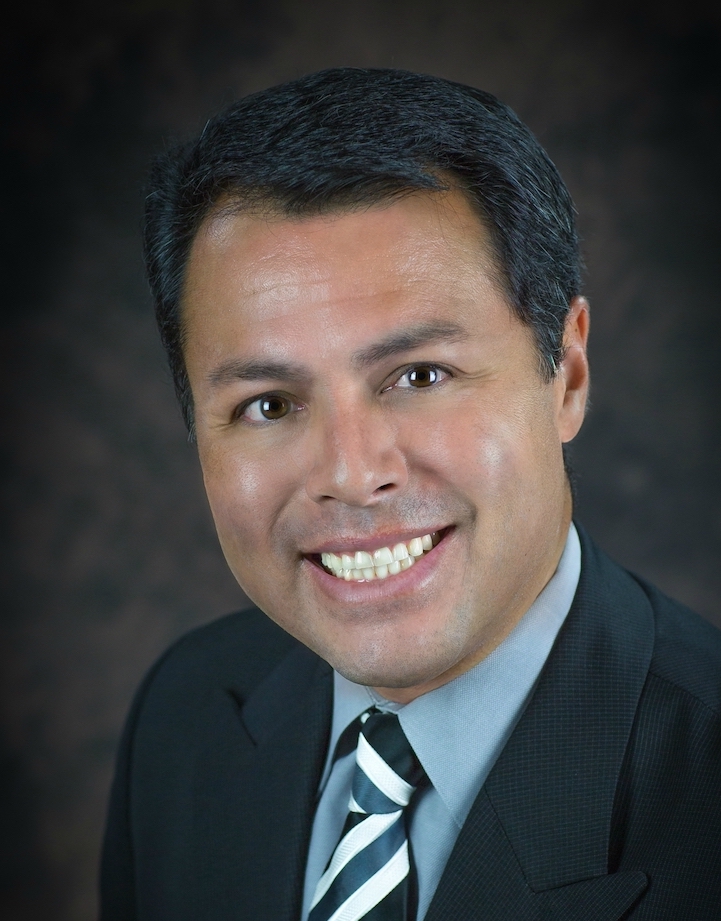
“It’s a privilege to have been selected to lead the department that focuses on taking care of our team members,” Lopez said. “I’m excited to join the Waco ISD family in its effort to develop leaders and support multiple pathways for educators to advance their careers in the district. I look forward to building relationships, learning about strengths and opportunities, and cultivating a collaborative culture.”
Lopez has 25 years of experience in education where he started as a paraprofessional and then a bilingual educator. Since 2019, he has served as the executive director of human resources in Denton ISD. Prior to that role he served as Denton ISD’s area superintendent of academic programs, an executive director of student support services in Spring ISD and an assistant director of student services in Carrollton-Farmers Branch ISD.
“Daniel is a dynamic bilingual educator with over 20 years of experience in the classroom, as a campus leader, and as a human resource professional,” Dr. Kincannon said. “He understands that recruiting and retaining top talent is critical to achieving our mission and ensuring staff can focus on providing our students with an exceptional educational experience that truly meets their needs.”
Lopez received a doctorate in professional leadership from the University of Houston, a master’s degree in educational administration from Texas A&M University and a bachelor’s degree from the University of Texas at Dallas. He also spent over seven years as an elementary school principal in Spring, Conroe, and Goose Creek ISDs.
Dr. Josie Hernandez-Gutierrez, who previously served as the assistant superintendent for human resources, was named as the district’s deputy superintendent in July.

Joshua Wucher is Waco ISD’s executive director for communications.
The Act Locally Waco blog publishes posts with a connection to these aspirations for Waco. If you are interested in writing for the Act Locally Waco Blog, please email Ferrell Foster at [email protected].
By Susan Menninger Krause
YMCA of Central Texas, Meals on Wheels Waco, and the City of Waco are working together to help the community take control of their health through blood pressure self-monitoring.
Nearly half of the adults in the U.S. have high blood pressure and only one in four have their blood pressure under control. High blood pressure increases the risk for heart disease and stroke, but heart attack and stroke are less likely if blood pressure is controlled. When people begin to pay attention to their blood pressure, they can better control it and improve their lives.
On Monday, Sept. 13 (11 a.m.-noon), a YMCA Healthy Heart Ambassador will begin coming to Sul Ross Senior Center to present the YMCA’s Blood Pressure Self-Monitoring program as part of the Meals on Wheels Waco programming. The program is free to eligible community members.
The YMCA’s Blood Pressure Self-Monitoring program is designed to help adults with hypertension manage and lower their blood pressure. It is a four-month program that focuses on teaching proper techniques to measure blood pressure and providing individualized support and nutrition education.
The goals of the program are to lower and manage blood pressure, increase awareness of triggers that elevate blood pressure, and help participants develop healthier eating habits. Expectations of participants are to attend office hours at Sul Ross two times a month, self-monitor blood pressure two times a month, and attend a monthly nutrition workshop.
For more information, contact Crystal Hernandez at 254.776.6612 or [email protected].
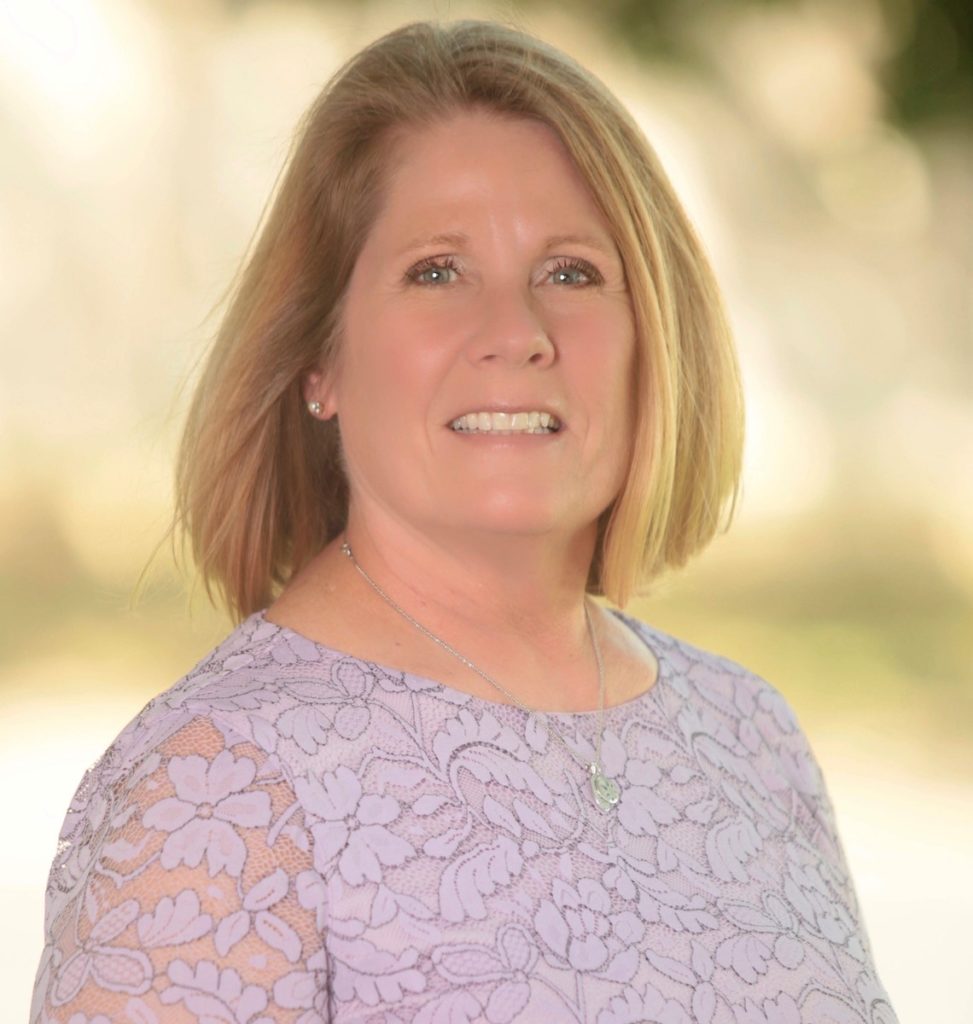
Susan Menninger Krause is manager of parks and rec facilities and programs for the City of Waco Parks and Recreation. Susan formerly was branch executive director at Waco Family YMCA.
The Act Locally Waco blog publishes posts with a connection to these aspirations for Waco. If you are interested in writing for the Act Locally Waco Blog, please email Ferrell Foster at [email protected].
By Jeremy Rhodes
The first wave of data releases from the 2020 US Census is here, and many of the demographic shifts that we’ve seen across the country and the state are mirrored in our Waco community. In this series of posts, I am presenting some of the demographic changes we see in McLennan County from 2010 to 2020.
The first post presented numbers regarding general population growth and decline. The second post showed an overview of racial and ethnic changes in the county. The third post expanded on the racial/ethnic changes in McLennan County since 2010. In this post, we will look at some of the changes to the housing landscape in Waco since 2010.
This first map shows the number of housing units in each area, as well as the change in housing units since 2010. The orange areas saw a decline in total housing units, with darker shades indicating a larger decline. The green areas saw an increase in total housing units, with darker shades indicating a larger increase. The top number shows the total number of housing units in that area, while the bottom number shows the change in number of housing units since 2010.
Most of central Waco and north Waco saw little change in total number of housing units from 2010 to 2020. The largest growth in housing units was seen in China Spring, with an addition of 1131 housing units, and Hewitt, with an addition of 1,000 units. Only six census tracts saw declines in the number of housing units since 2010. One of the historic East Waco tracts (tract 15) saw the largest decline in housing units, with a loss of 141 households. Most of the county saw moderate to robust housing growth.
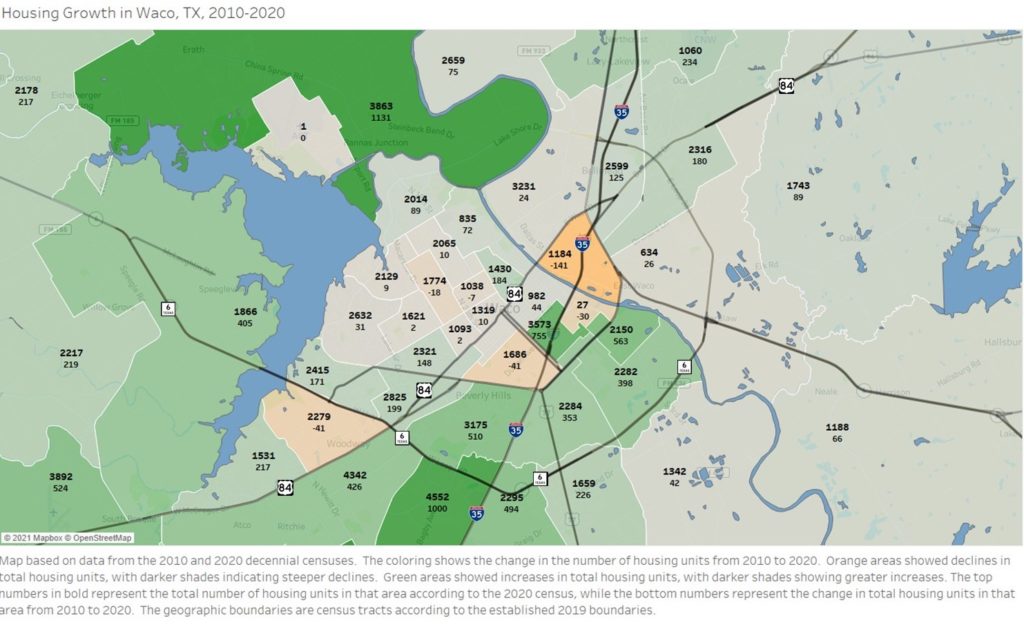
The second map is similar to the first. The coloring is the same, with green shades indicating growth in housing units since 2010, and orange shades indicating decline in housing units since 2010. The black number in each tract is different in this map; it displays the number of residents per household in that area. Most of the county has between two and three people per household. Notable exceptions include downtown Waco and historic East Waco, where there are fewer than two residents per housing unit.
There are two outlier tracts that should be explained. In the northwest of the map, you will see a tract with 17 people per household. That tract is the airport, and we should not think too much about housing and population data for that tract. The other outlier is the tract containing Baylor University, which has a “persons per household” of 149.6. Although the Census Bureau does not consider dorms to be housing units, I cannot be certain how they obtained such a high number while excluding dorms from consideration.
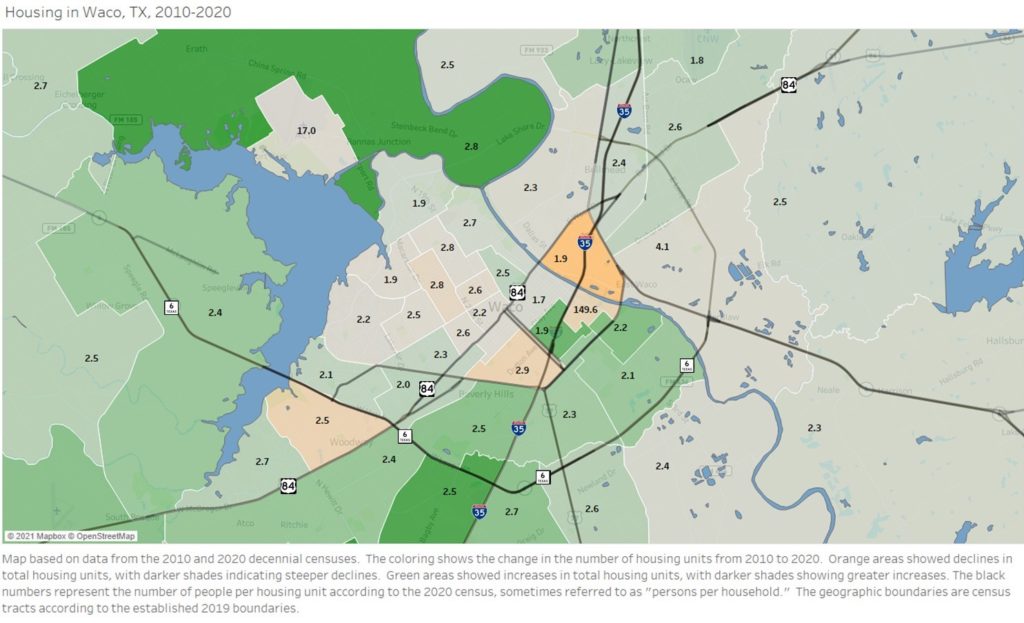
If you have any questions about this, or if you would like Jeremy to give an overview of these changes to your group, staff, or organization through Zoom or in person, please contact Jeremy Rhodes at [email protected].
Jeremy Rhodes, Ph.D., is director of research and community impact for Prosper Waco.
The Act Locally Waco blog publishes posts with a connection to these aspirations for Waco. If you are interested in writing for the Act Locally Waco Blog, please email Ferrell Foster at [email protected].
By Jeremy Rhodes
The first wave of data releases from the 2020 US Census is here, and many of the demographic shifts that we’ve seen across the country and the state are mirrored in our Waco community. In this series of posts, I will present some of the demographic changes we see in McLennan County from 2010 to 2020.
The first post presented numbers regarding general population growth and decline. The second post showed an overview of racial and ethnic changes in the county. This post will expand on the racial/ethnic changes in McLennan County since 2010.
I made a series of maps that show us which parts of Waco have experienced growth and decline for some of the major racial and ethnic groups from 2010-2020, using census tract boundaries. For each of these maps, the orange areas showed decline for that group, while the green areas showed increases for that group. The black numbers represent the percentage of the residents in that tract who identify with that racial or ethnic group, according to 2020 census numbers.
As I mentioned in the previous post, the Census Bureau advises caution when comparing the racial and ethnic composition of 2010 to that of 2020. According to their website, “data comparisons between the 2020 Census and 2010 Census race data should be made with caution, taking into account the improvements we have made to the Hispanic origin and race questions and the ways we code what people tell us.”
The first map shows us Waco’s Latino population. Almost the entire map is green, indicating numerical growth in almost every census tract. “Percent Latino” declined in 4 census tracts, but increased everywhere else in the county. Even areas with a relatively small Latino population, such as China Spring, Speegleville, Woodway, and Hewitt, showed increases.
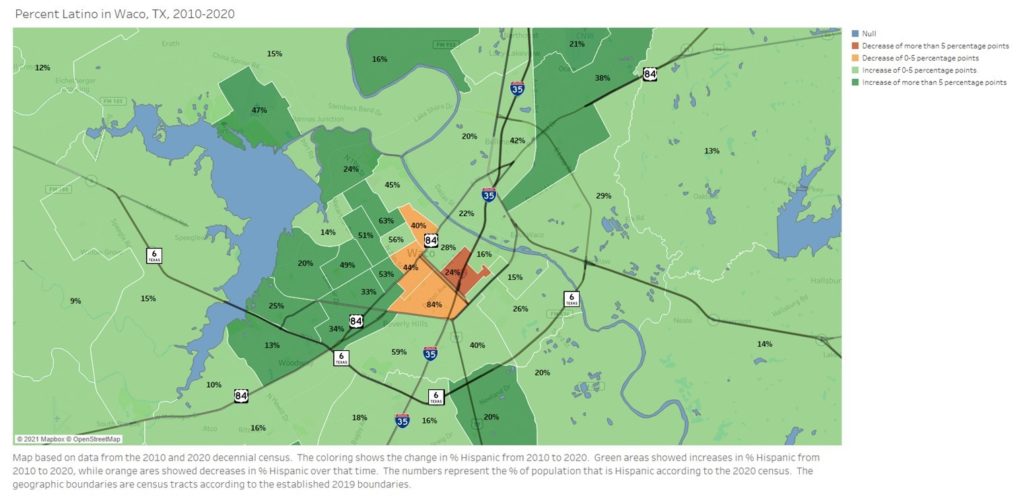
The next map shows Waco’s population who identify as White alone, non-Hispanic. It’s almost the complete opposite of the Hispanic map. Whereas the map of Latinos is almost entirely green, the map of Whites is almost entirely orange. Four census tracts in the interior of Waco show modest increases in percentage of the population that is White, but those are all tracts that already have a low percentage of Whites.
Everywhere else in the county shows declines in percentage of the population that is White. It should be noted that the orange areas do not necessarily represent a decline in the number of White people in that area, just a decline in the percentage of the population that is White. Many of the orange areas on each of these maps have more people in them from those groups, just a lower share of the population. It should also be noted that most of the orange areas on this map are a dark orange, indicating a decline of more than 5 percentage points since 2010.
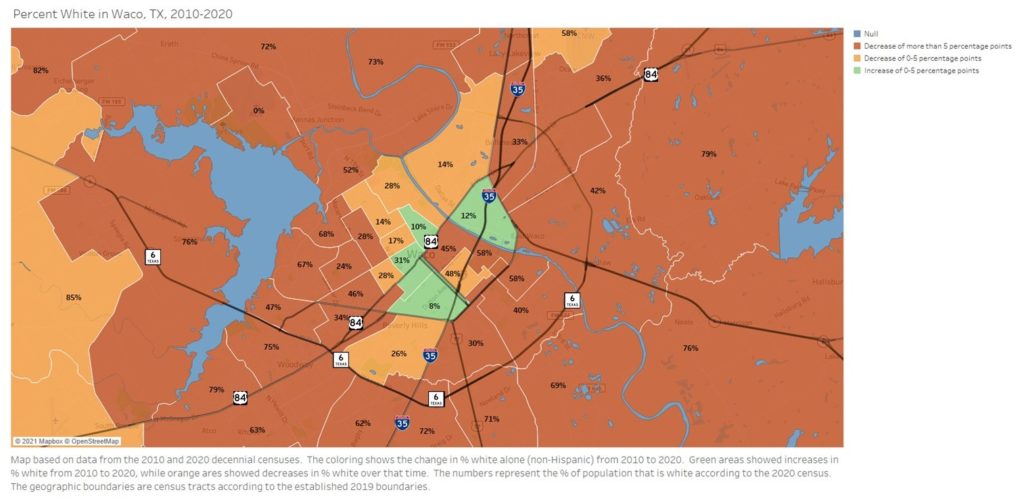
The next map shows the growth and distribution of Black residents in Waco who identify as only Black, non-Hispanic. Unlike the maps for Latinos and Whites, this map shows a mixed story. The tracts are split evenly between those that show growth in percentage Black and those that show decline. East Waco showed a decline in percentage Black, but these areas are still the places in Waco with the highest percentage of African Americans.
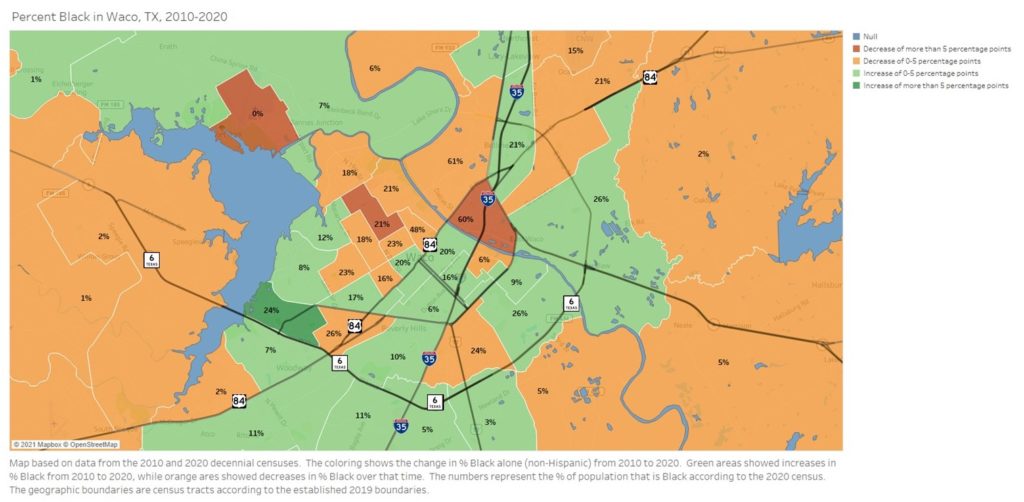
The next map shows the growth and distribution of Asians in Waco, which includes folks who identify with East Asian cultures such as those of China and Korea, Southeast Asian cultures such as those of Vietnam and Indonesia, and South Asian cultures such as those of India and Pakistan. Similar to the story for Latinos, most of Waco has seen an increase in the percentage of residents who identify as Asian. Most of the areas of Central Waco have seen modest increases in percent Asian, though the numbers remain small. In most Waco census tracts, less than 2% of the residents are Asian. The notable exceptions include areas near Baylor University, and the Hewitt/Woodway areas.
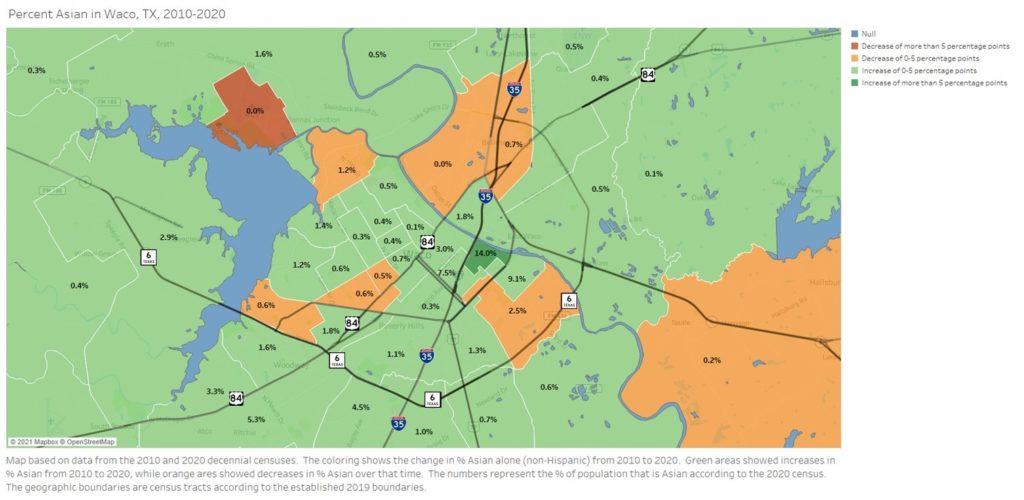
The final map shows the percentage of Waco residents who identify with more than one racial identity. All areas have shown growth, and the shade of green shows the amount of growth for that census tract. The areas with the darkest shade of green, mostly within the city limits, have each seen increases of at least 10 percentage points. As I mentioned in the previous post, the increase in multiracial people is caused by 3 reasons.
- Improvements in the census questions allow for a more accurate count
- Reduced stigma for interracial couples has led to more pairings, and more biracial children
- Interracial people are more willing to identify as such than in the past
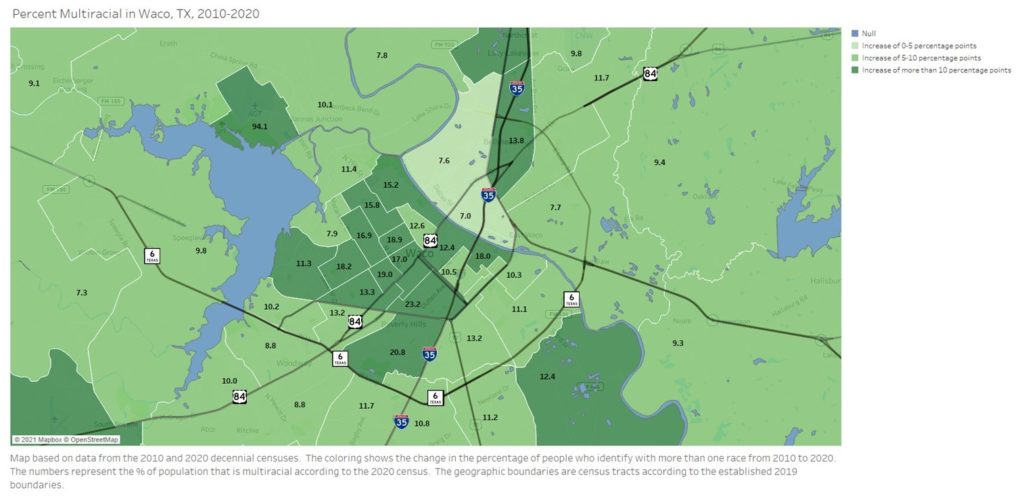
If you have any questions about this, or if you would like Jeremy to give an overview of these changes to your group, staff, or organization through Zoom or in person, please contact Jeremy Rhodes at [email protected].
Jeremy Rhodes, Ph.D., is director of research and community impact for Prosper Waco.
The Act Locally Waco blog publishes posts with a connection to these aspirations for Waco. If you are interested in writing for the Act Locally Waco Blog, please email Ferrell Foster at [email protected].
By Jeremy Rhodes
The first wave of data released from the 2020 US Census is here, and many of the demographic shifts that we’ve seen across the country and the state are mirrored in our Waco community. In this series of posts, I am presenting some of the demographic changes we see in our county from 2010 to 2020. The first post presented numbers regarding general population growth and decline. This second post will show an overview of racial and ethnic changes in the county.
The census website advises caution when comparing the racial and ethnic composition of 2010 to that of 2020. According to their website, “data comparisons between the 2020 Census and 2010 Census race data should be made with caution, taking into account the improvements we have made to the Hispanic origin and race questions and the ways we code what people tell us.”
With that caveat in mind, from 2010 to 2020, the U.S. saw the most dramatic growth among two racial and ethnic groups: Latinos and multiracial people. The U.S. saw a 23% increase in Latinos, while the state of Texas saw a 21% increase in Latinos. In McLennan County, the Latino population increased by 23.6%, or an addition of 13,116 people. Multiracial Americans also saw significant growth throughout much of the United States. In McLennan County, multiracial people now make up 11.8% of the population, which is an increase of 428.6%.
The following table shows a more detailed racial and ethnic makeup for the county, in comparison to Texas and the entire U.S.
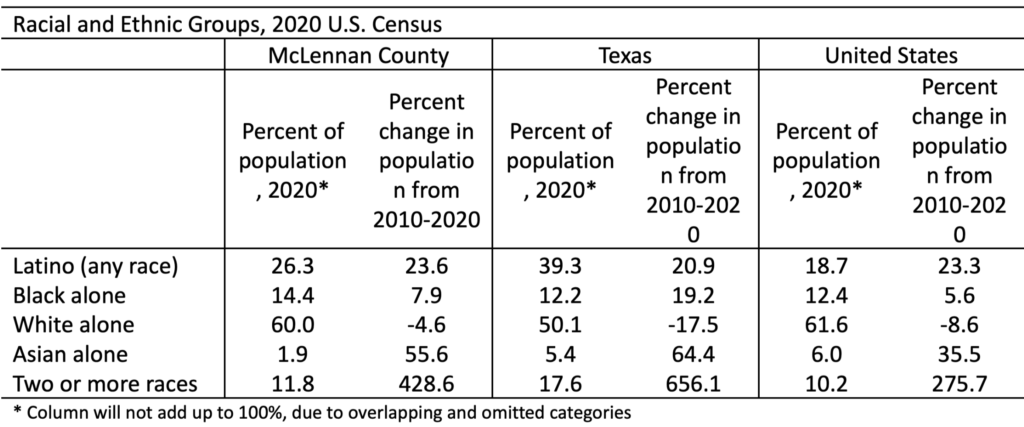
The tremendous growth of multiracial people is caused by multiple factors. The most obvious factor has to do with lessening stigma against interracial relationships. As we come to see more and more interracial pairings, we will have more biracial children being born.
Second, the Census Bureau has improved the way they ask the race/ethnicity question by creating two separate questions for race and ethnicity, which experts believe will provide a more accurate portrait of how people identify (this change is expected to also improve our count of Latinos in America).
Third, there is evidence that multiracial individuals are more willing to identify as such than in the past. For example, a person who has one Black parent and one Latino parent is now less likely to choose between those two identities, and more likely to identify as both.
The next post in this series will display maps that show where we have seen the growth and decline for specific racial/ethnic groups in Waco. If you have any questions about this, or if you would like Jeremy to give an overview of these changes to your group, staff, or organization through Zoom or in person, please contact Jeremy Rhodes at [email protected].

Jeremy Rhodes, Ph.D., is director of research and community impact for Prosper Waco.
The Act Locally Waco blog publishes posts with a connection to these aspirations for Waco. If you are interested in writing for the Act Locally Waco Blog, please email Ferrell Foster at [email protected].
